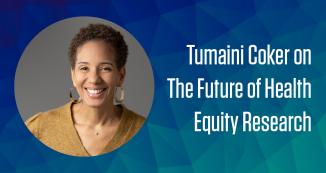
22 Mar To Fight Childhood Obesity, Look to the Future
Despite growing attention around the childhood obesity epidemic, many American parents continue to be in denial about their children’s weight. Just last year, nearly 95 percent of parents of overweight children and 78 percent of parents of obese children perceived their child as “about the right weight” in a study in Childhood Obesity.
Researchers compared these 2012 National Health and Nutrition Examination Survey results to a similar survey from 1994. They found that, after adjusting for sociodemographics and BMI z-scores, the probability that parents could identify their child’s weight accurately had declined by 30 percent.
Those results are not surprising to Dr. Davene Wright, a University of Washington Assistant Professor of Pediatrics, Investigator within the Center for Child Health, Behavior, and Development at Seattle Children’s, and past Institute of Translational Health Sciences KL2 Scholar.
Wright believes there are a number of reasons parents may misperceive or misreport their child’s weight. Parents may be heavy themselves, and view being overweight as normal. Or they could be confused by BMI percentiles and the terms overweight and obese.
We have parents who are optimistic about their kid’s future and want the best. But they have to engage in healthy behaviors to ensure that. They can’t just hope that it’s going to happen.
Parents may also fear being labeled a bad parent or being accused of doing something wrong.
There is also blind optimism. In a survey recently administered by Wright, only 8 percent of parents thought their child would be overweight or obese as an adult.
In reality, 66 percent of Americans are currently overweight or obese, and overweight children are five times more likely to be overweight as an adult. Parents should “realize that this is something that could realistically happen. They need to prepare and work against this,” Wright said.
“We have parents who are optimistic about their kid’s future and want the best. But they have to engage in healthy behaviors to ensure that. They can’t just hope that it’s going to happen,” she added.
My fear is that when you directly ask a parent, do you think your kid is overweight, they are going to say no.
In a recent survey of parents of overweight and healthy children, Wright asked the standard perception question: When your child is an adult, do you think he or she will be at a healthy weight or overweight?
Then she asked parents to think about obesity-related chronic health conditions: On a scale of 0 to 100, predict your child’s probability of developing hypertension, heart disease, depression, and diabetes.
Despite under-perceiving their child’s current BMI class, parents of children with obesity estimated their children to be at greater risk for obesity-related health conditions than parents of healthy weight children by 5 to 6 percentage points.
[The KL2 Program] helps you take a step back and see your research with not necessarily different eyes, but fresh eyes. It makes your research relevant and accessible.
“My fear is that when you directly ask a parent, do you think your kid is overweight, they are going to say no,” Wright said. “Asking a parent about these comorbidity risks is an attempt to get at what they actually think about their child’s future health prospects.”
Considering these study results, Wright’s hope is that discussions focused on how a child’s weight today impacts the child’s health in the future will better resonate with parents.
Wright added that it is easy for parents to ignore obesity, choosing to focus on tangible health issues like asthma. Emphasizing that obesity now will increase future hypertension and diabetes risk “seems more proximal and will potentially have an impact on behaviors,” Wright explained.
The next phase in Wright’s research is developing tools to convey these future outcomes.
In her work as a decision scientist, Wright helps build simulation models that are often used to make policy decisions. Translating these models into clinician-friendly tools could help parents visualize the future, thereby encouraging behavior change, Wright said.
Wright was supported during the last year by the ITHS KL2 Multidisciplinary Clinical Research Career Development Program, which offers rigorous training and mentoring in clinical and translational research for junior faculty.
One of the benefits of the KL2 program was being part of a multidisciplinary environment, Wright said. KL2 Scholars from a variety of backgrounds, including general medicine, dentistry, basic science, and social work, all bring a different perspective. “It helps you take a step back and see your research with not necessarily different eyes, but fresh eyes. It makes your research relevant and accessible.”
This March, Wright transitioned from the ITHS KL2 Program to a K01 Mentored Research Scientist Career Development Award. She will continue to focus on identifying new strategies to help tackle childhood obesity.
To learn more about Wright’s work, watch her Seattle Children’s presentation, “Hardwired for Hope: How Parents Estimate Their Child’s Risk for Future Obesity and Chronic Disease.”








